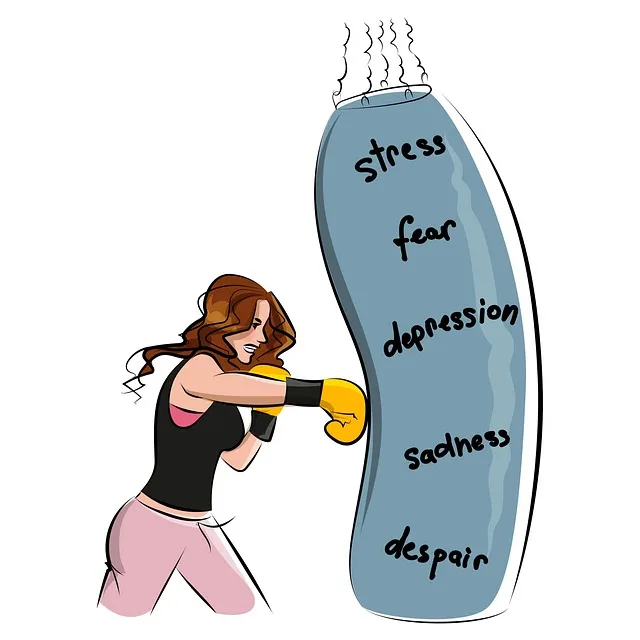Aurora Kaiser Permanente prioritizes risk assessment in mental health practice, focusing on identifying and mitigating vulnerabilities through evidence-based strategies. Their approach incorporates emotional well-being promotion, crisis intervention guidance, and self-care practices for both patients and healthcare providers. By integrating education, open dialogue, and policy advocacy, they enhance access to comprehensive care while fostering professional resilience and community well-being. Continuous improvement through regular reviews and training programs ensures their mental health services remain safe, effective, and innovative.
Mental health professionals regularly confront complex risks within their practice. This article explores a structured approach to risk assessment, drawing on the comprehensive framework developed by Aurora Kaiser Permanente. We delve into identifying patient vulnerabilities, mitigating potential hazards, and emphasizing continuous improvement through regular review and training. By adopting evidence-based strategies, mental health services can enhance safety for both patients and providers, reflecting the commitment of organizations like Aurora Kaiser Permanente to optimal care.
- Understanding Risk Assessment in Mental Health Practice
- The Aurora Kaiser Permanente Approach: A Comprehensive Framework
- Identifying Risks and Vulnerabilities: Patient Considerations
- Mitigating Hazards: Strategies for Mental Health Professionals
- Continuous Improvement: Regular Review and Training for Effective Risk Management
Understanding Risk Assessment in Mental Health Practice

In the realm of mental health practice, risk assessment is a crucial process that involves identifying and evaluating potential hazards or vulnerabilities within an individual’s psychological landscape. This methodical approach, integral to Aurora Kaiser Permanente mental health services, aims to predict and mitigate risks associated with various mental health conditions. By employing techniques such as emotional well-being promotion and emotional intelligence, professionals can proactively address factors contributing to depression prevention, ensuring patient safety and fostering positive outcomes.
Mental health practitioners utilize risk assessment to tailor interventions and treatment plans accordingly. It involves scrutinizing a patient’s history, current symptoms, and environmental factors to anticipate potential crises or relapses. This proactive measure enables healthcare providers at Aurora Kaiser Permanente to offer timely support, implement effective coping strategies, and ultimately enhance the emotional resilience of their clients.
The Aurora Kaiser Permanente Approach: A Comprehensive Framework

The Aurora Kaiser Permanente Approach to mental health services stands out as a comprehensive framework designed to prioritize both patient well-being and professional resilience. This method integrates various strategies, including robust Crisis Intervention Guidance, to ensure healthcare providers are equipped to handle acute situations effectively while fostering a supportive environment. By emphasizing self-care routine development for better mental health, the organization recognizes the importance of maintaining professionals’ well-being to deliver optimal care.
Through their Mental Wellness Podcast Series Production, Aurora Kaiser Permanente encourages open dialogue and education on mental health topics. This initiative not only raises awareness but also provides a platform for sharing best practices and personal experiences, creating a culture of support within the profession. The holistic approach, encompassing crisis management, self-care promotion, and knowledge sharing, positions Aurora Kaiser Permanente as a leader in promoting mental wellness among its professionals.
Identifying Risks and Vulnerabilities: Patient Considerations

Identifying Risks and Vulnerabilities requires a nuanced approach when considering patients within Aurora Kaiser Permanente mental health services. Mental health professionals must assess not only the patient’s immediate needs but also their broader circumstances, which can include social determinants of health, economic factors, and environmental influences. For instance, patients facing housing instability or financial strain may experience heightened stress levels, impacting their mental well-being and treatment outcomes.
The design of mental health services should incorporate strategies to address these vulnerabilities, such as integrating Mental Health Education Programs that empower individuals with coping mechanisms and emotional intelligence. Additionally, advocacy efforts aimed at policy analysis can play a crucial role in mitigating systemic risks by advocating for policies that support vulnerable populations and enhance access to comprehensive mental healthcare.
Mitigating Hazards: Strategies for Mental Health Professionals

Mental health professionals are often at the forefront of supporting individuals through challenging situations, which can take a significant toll on their own well-being. Mitigating hazards and fostering resilience is therefore crucial for maintaining optimal performance and preventing burnout. Strategies for navigating this include prioritizing self-care practices such as regular exercise, mindfulness meditation, and engaging in emotional healing processes like therapy. Cultivating compassion towards both clients and oneself can help professionals maintain a healthy work-life balance.
Additionally, integrating self-esteem improvement techniques into personal routines can boost resilience against stress and adversity. Organizations like Aurora Kaiser Permanente mental health services emphasize these practices, recognizing their value in supporting professionals’ long-term wellness. By adopting evidence-based strategies, mental health professionals can enhance their ability to provide effective care while safeguarding their own emotional well-being.
Continuous Improvement: Regular Review and Training for Effective Risk Management

At Aurora Kaiser Permanente mental health services, continuous improvement is a cornerstone of our approach to risk management. Regular reviews and comprehensive training programs are integral to ensuring that our professionals remain at the forefront of best practices in risk assessment and emotional healing processes. Through ongoing education, we foster an environment where inner strength development is not just taught but also experienced. This dynamic approach allows us to adapt to emerging challenges and trends, ultimately enhancing the safety and effectiveness of our services.
By scheduling periodic assessments and workshops, we encourage open dialogue about new research, methodologies, and patient-centric strategies. These sessions delve into complex scenarios, enabling practitioners to refine their risk assessment skills. By embracing a culture of continuous learning, Aurora Kaiser Permanente empowers its mental health professionals to navigate the intricate landscape of patient care with confidence and resilience, thereby enhancing the overall well-being of our community.
Mental health professionals play a vital role in fostering well-being, yet they are not immune to risks. Implementing robust risk assessment practices, such as the comprehensive framework offered by Aurora Kaiser Permanente mental health services, is essential for safeguarding both patients and practitioners. By identifying potential hazards, understanding patient vulnerabilities, and adopting effective mitigation strategies, professionals can enhance their ability to provide safe, high-quality care. Continuous improvement through regular review and training further strengthens risk management, ensuring a resilient and supportive environment within the field of mental health practice.






